In first week, Provost Charles Isbell begins to settle into his new academic home
As he set up his office at Bascom Hall last week, Charles Isbell unboxed 19 framed 8-by-10-inch photos, each one of a PhD student he advised at the Georgia Institute of Technology. The photos will line the wall behind his desk, said Isbell, who began Aug. 1 as provost at the University of Wisconsin–Madison. “It’s a reminder that this is why we do it,” he said. “This is why we come here every day.”

Isbell unpacks framed photos of his doctoral advisees from moving boxes in his office in Bascom Hall during his first week as provost. Photo: Bryce Richter
As provost, Isbell will be UW–Madison’s chief academic officer and its second-ranking leader after Chancellor Jennifer L. Mnookin. He succeeds Karl Scholz, who left in April to become president of the University of Oregon. Eric Wilcots, dean of the College of Letters & Science, served as interim provost.
In announcing Isbell’s hiring, Mnookin noted his exceptional credentials as a scholar and praised him as “an experienced and effective administrator, a skilled collaborator and an advocate for access to STEM and higher education.”
In an email to the campus community on his first day, Isbell thanked Mnookin “for this amazing opportunity” and said he was “eager to begin my work with her, as well as the deans, shared governance and other university leaders.”
A lifelong passion
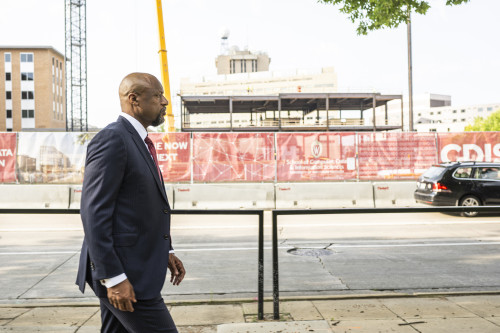
Isbell walks past the construction site for the School of Computer, Data & Information Sciences Building. Isbell is an expert in machine learning and artificial intelligence. “I try to build machines and systems that are really smart — and not just smart in a room, but smart in a social context with human beings,” he said. Photo: Bryce Richter
Isbell’s academic expertise is in machine learning and artificial intelligence, passions of his since childhood. He built his first robot in high school. Today, he encourages people to think beyond the loaded buzzword AI has become. His work, he said, is human-centered.
“I try to build machines and systems that are really smart — and not just smart in a room, but smart in a social context with human beings,” he said. “It’s all about modeling and understanding human behavior and building systems that are part of a person or a group of people, as opposed to something that is just faster or smarter at whatever little thing it does.”
Isbell’s work has garnered international recognition and numerous awards. Next month, he will travel to Texas to receive the 2023 Richard Tapia Award, an honor given to those who “represent extraordinary leadership in computing scholarship and the mission to increase participation of groups who are underrepresented in computing.”
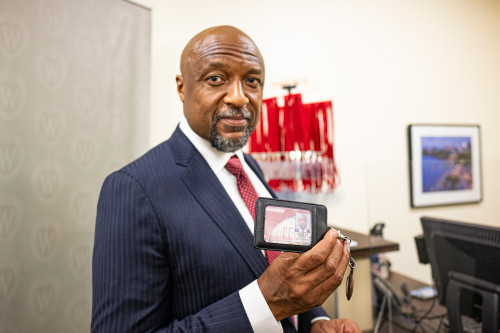
Isbell gets his Wiscard at Union South. Photo: Bryce Richter
Isbell comes to UW–Madison from Georgia Tech, where he spent the last 21 years, most recently as the John P. Imlay Jr. Dean of the College of Computing. His ties to Georgia Tech run deep, dating back to his bachelor’s degree in information and computer science.
As Isbell began acclimating himself to campus last week, the differences between UW–Madison and his former institution surfaced in often lighthearted ways. He briefly winced after being handed his Wiscard. His Badger ID headshot is surrounded in red — the hue of Georgia Tech’s bitter rival, the University of Georgia.
“That’s the enemy’s color,” Isbell joked. “This is going to take some getting used to.”
‘All-in’ as a Badger
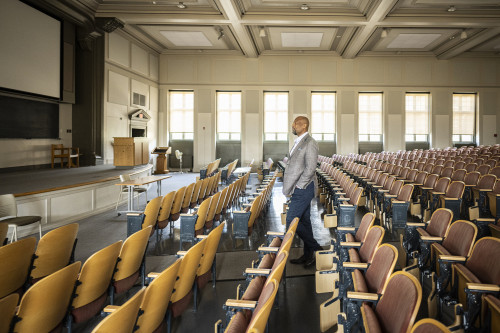
Isbell said of Bascom Hall, “This building — it’s what people picture college looking like.” Photo: Bryce Richter
But he wants Badgers to know he’s all-in — he has already scrubbed “Georgia Tech Professor” from his license plate holder. He’s eager to learn about the campus and the community and looks forward to doing so “before this place gets hit with 14 inches of snow.”
His Badger rites of passage last week included a ride on the No. 80 bus and a tour of Bascom Hall. “This building — it’s what people picture college looking like,” he said.
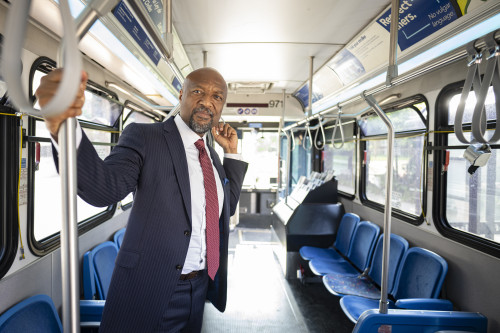
Provost Charles Isbell rides the Route 80 bus back to his office in Bascom Hall. During his first week at UW–Madison, Isbell met with staff, faculty and a delegation from Louisiana State University. As provost, Isbell will be UW–Madison’s chief academic officer and its second-ranking leader after Chancellor Jennifer L. Mnookin. Photo: Bryce Richter
His official duties began almost immediately. On his second day, he helped Chancellor Mnookin welcome a delegation to campus from Louisiana State University, including its president, William Tate IV. The LSU group had requested the visit, expressing interest in UW–Madison’s strong agricultural programs.
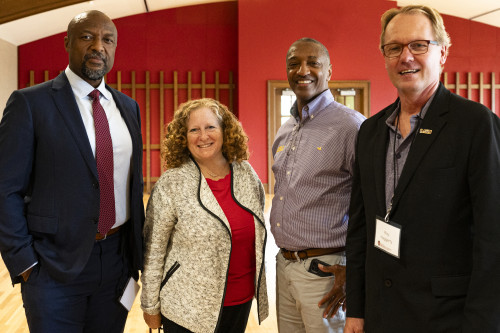
Isbell (left) and UW Chancellor Jennifer Mnookin meet with a delegation from Louisiana State University, including LSU President William Tate (second from right) and LSU Executive Vice President and Provost Roy Haggerty (right). Photo: Bryce Richter
At a meeting of the Academic Staff Executive Committee on Thursday, Isbell was asked what motivated him to seek the UW–Madison position. Isbell said there are many interesting opportunities and new directions happening around higher education and he wants to be engaged with those possibilities at a high level and at an institution with the breadth, depth and reputation of UW–Madison.
“Also,” he said to laughs, “Madison is a very cool place, and I’ve only visited in the summer.”
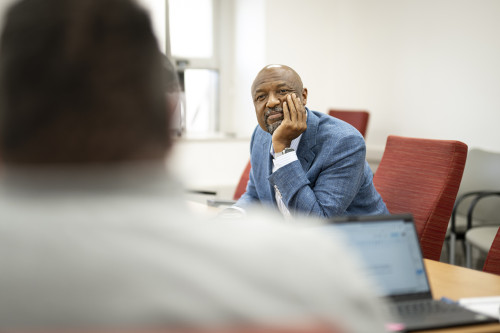
During his first week, Isbell spoke with members of the Academic Staff Executive Committee in Bascom Hall. Photo: Bryce Richter
In an interview, Isbell said he intends to be a strong advocate for faculty and staff but knows that not every decision he makes will be popular with everyone.
“In those instances, I hope people will know me well enough to know who I am, that I listened to them and made the best decision I could given all the things I had to balance,” he said. “I hope it becomes clear as time goes on that I have a strong set of values that guides me — a North Star that I’m traveling toward — and that those values include honesty, fairness and transparency.”
As for students, Isbell said he plans to work with Chancellor Mnookin to find ways to stay engaged in their lives, even though he will no longer be teaching. (He just finished grading his Georgia Tech summer students last week.) At the very least, he hopes to squeeze in time to occasionally be a guest lecturer in a UW course.
Comic books and Ultimate Frisbee
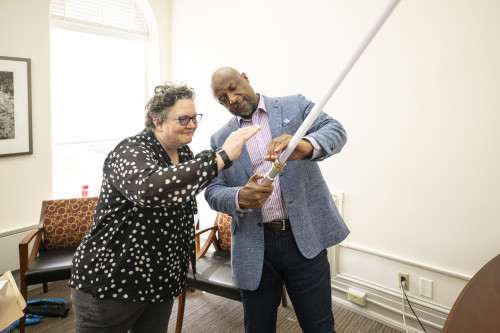
Isbell shows a lightsaber replica on display in his office as he meets with Amy Gilman, director of the Chazen Museum. Photo: Bryce Richter
Outside of work, Isbell’s interests are many and varied. He has been collecting comic books since age 13 and owns around 23,000 (13,000 physical copies, 10,000 digital). They are stored in a special room in his house. He loves sci-fi, fast cars and bacon. (For years, he’s had bacon delivered to his house in Atlanta from Nueske’s Applewood Smoked Meats in Wittenberg, Wisconsin.) Just seven hours after his plane landed in Madison, Isbell could be found playing Ultimate Frisbee at Olbrich Park with an over-40 team. It’s a go-to sport for him along with racquetball. “These things keep me sane,” he said.
Isbell and his wife, Sheila, have two children: Cody, a high school sophomore, and Joni, who is following in her father’s footsteps as a computer science major at Georgia Tech.
Isbell’s interest in finding ways to make computer science accessible to a wide audience has led to numerous projects with Michael Littman, a Brown University professor and longtime collaborator. Together, they are known as the musical duo Smoov and Curly, names bestowed upon them by students. (Here’s their latest video, “Mean Without a Cluster.”)
“The whole thing is kind of an inside joke that we hope is funny enough to make people want to understand computer science better,” Isbell said.
Though Isbell loves music, no one should confuse him with a talented singer, he said: “I can’t carry a tune.”
‘It’s just who I am’
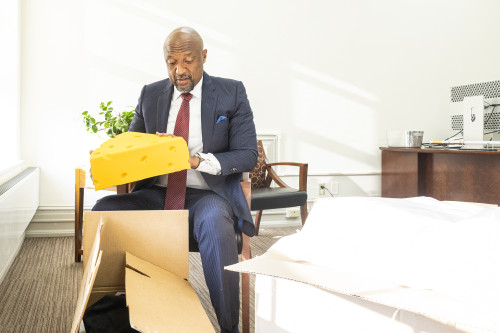
Isbell unboxes a Cheesehead hat in his new office. Photo: Bryce Richter
Asked if it is accurate to describe him as someone with many sides, Isbell thinks a bit and then says, “Actually, it’s all one side. It’s just who I am. I don’t know how to be an administrator without also being a scholar. I don’t know how to be a scholar without also being someone who thinks about comic books. I don’t know how to separate those things out.”
The whimsical touches in his office reflect this, like the large Star Wars light saber on his desk that glows purple.
Visitors to his office also will see, in addition to the photos of his 19 former PhD students, a large poster that traces his academic genealogy as a mathematician — a gift from a student and based on work by the Mathematics Genealogy Project. Isbell was recently heartened to notice a connection to UW–Madison that hadn’t jumped out to him before. One of his PhD adviser’s advisers — Thomas Binford — received his doctorate from UW–Madison in 1965.
The poster and the student PhD photos complement each other, Isbell said.
“These are my ancestors and my descendants,” he said. “They help me remember that I’m part of a bigger story.”
Tags: leadership, provost




